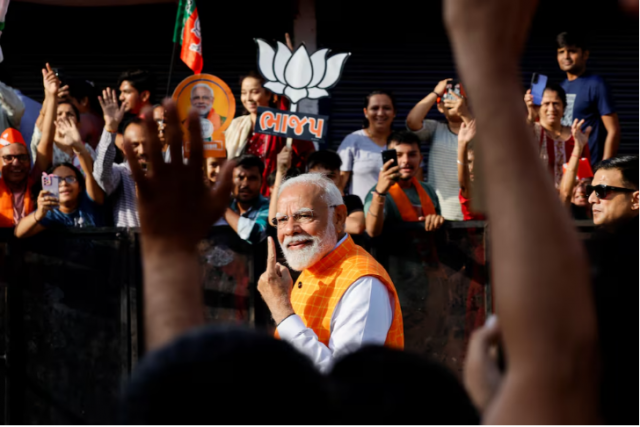Minutes after the conclusion of the seventh and the final phase of polling that had polled over 50 Lok Sabha constituencies, the TV news-noise channels began flashing the exit poll results giving abnormal outcome to the ruling Modi government. Some surveys show their supreme leader's party striking over 50 per cent of vote share and crossing the unassailable 400 plus seat lead. As the case with electoral situations in third world like in the African, middle eastern and Latin American political circus that involves massive rigging and voter fraud, Indian elections have sadly fallen prey to these kind of heinous and disturbing process.
This 2024 Lok Sabha elections is touted as potentially the last election in a democratic India, and therefore many political commentators are of the belief that this might be the last ditch to save the world’s largest democracy. Nevertheless, the TV news channels (Godhi Media), the WhatsApp university and the ruling Indian middle class refuses to see the obvious, and instead have indulged in hero worshipping of a political leader that refuses to see himself as a biological human. On public platforms during his rallies, the supreme leader openly states “All animals in the farm are equal, but some Animals in the farm cannot be trusted” and on even days while on TV speaking up, close and personal with friendly journalists retracts his comments saying “Some animals in the farm cannot be trusted, but never specified the kind and species of animals”.
In January this year, riding high after the jubilant and ritualistic inauguration of the renovated ancient Ram Mandir at Ayodhya, Prime Minister Modi buoyantly raised the slogan “Ab Ki baar Chaarso Paar” propelling the hapless opposition into further retreat.
The ‘400 plus' slogan proved to be a double-edged sword to the BJP which was already in the driving seat. Yes, it did energise and charge up the BJP voter base, but it also sent concerning signals to various classes and sections of India’s society. Few BJP and RSS members came out uttering nonsensical comments and openly claimed that 400 plus seats was a necessity to rip apart the Indian constitution and rewrite it the ‘RSS and the Hindutva way’. Statements like these have caused major distress among the Dalit, Adivasi, backward classes and other religious minority population across the country. For the Dalit’s and the Adivasi’s of India, BR Ambedkar and the constitution of India are tantamount to ‘Prophet and the holy book’, without which they would be invisible and plunged into their past.
The attack on constitution and efforts to save it from being torn apart (Amended or distorted) became the most important agenda in the campaign as the opposition parties rammed heavily on the narrative, culminating towards a rather unexpected two-way fight between the gigantic NDA headed by the BJP and the underdog INDIA alliance lead by Congress.
Professor Parakalla Prabhakar, the renowned Indian economist, political analyst and the husband of India’s Finance minister Nirmala Sitaraman remarked in a recent interview that “the 2024 election is a battle between the BJP and the general public”, indicating the irrelevance of the opposition political parties and their capacity to overturn the elections. When asked about the fate of Narendra Modi, if BJP is out of power, Prabhakar responded with a rather tongue in cheek cryptic undertone saying “dictators either end up in handcuffs or in coffins”.
For the BJP to hit the magic number of 272 from the situation that it was in the first two phases of elections, two factors might have to play a vital role: first, the Indian middle class, and second, women. The Indian middle class largely in the urban areas have constructed a jungle of themselves. Their newsbytes arrive through early morning WhatsApp forwards, a yoga session or a post morning walk get together in the parks. Some of their comments are most vitriolic and disturbing. From calling for bombing of the neighbouring Pakistan to spewing venomous remarks against the large Muslim population in the country and in recent times extended to Sikh community too. Meanwhile, the same middle class has created deity of their own: Prime Minister Modi. In their minds, he could do no wrong and is beyond any criticism.
The women in India are not deep political thinkers; they are not news junkies and also do not beat their chest in flaunting their ethno-national identities or get into a verbal debate on political matters. For women in India, irrespective of cast and religious backgrounds, characters like Modi appeal the most, who’s been portrayed as a selfless bachelor striving hard to put his country and his fellow countrymen in the political map.
The return of Modi to power and the days that follow might have consequential impact in future of nations sociopolitical ethos.



COMMENTS (275)
Comments are moderated and generally will be posted if they are on-topic and not abusive.
For more information, please see our Comments FAQ